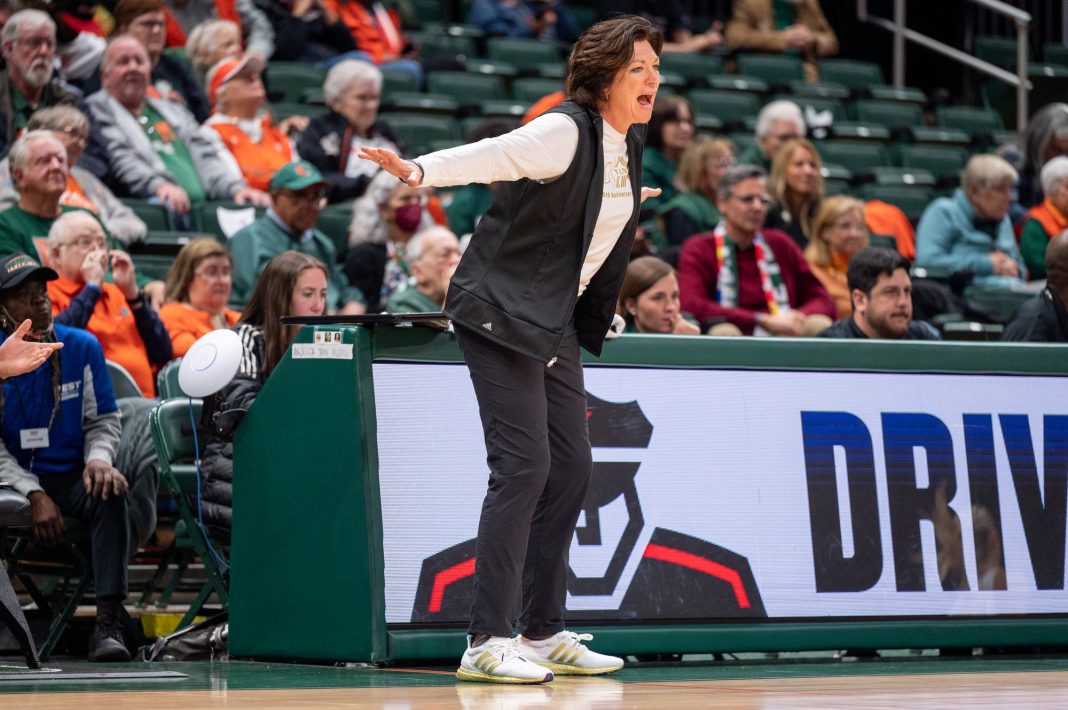
Miami women’s basketball became the first collegiate program sanctioned by the NCAA on Friday in relation to a case concerning name, image and likeness. The Hurricanes have been placed on one year of probation after the NCAA determined head coach Katie Meier facilitated impermissible contact between a booster, billionaire John Ruiz, and twins Haley and Hanna Cavinder during their recruitment process this past summer, according to a statement released by the Division I Committee on Infractions.
It is against NCAA rules to use NIL deals to persuade prospects to attend a certain school.
The University of Miami and the NCAA came to a negotiated resolution on Friday, which included additional minor penalties regarding future recruitment and a $5,000 fine.
Meier served a three-game suspension at the start of the season as part of the punishment.
The violation occurred when Meier asked an assistant coach to contact the Cavinders about the booster. Ruiz, one of the most prominent businessmen in Miami, is a UM alumnus who has offered over 100 college athletes NIL deals through his company, LifeWallet.
Additionally, Meier texted Ruiz that she would ensure the Cavinders knew about him, according to the NCAA. This led to a formal meeting between the two parties, when the Cavinder family had dinner at Ruiz’s home. It is against NCAA recruiting rules for boosters to have “in-person, off-campus contact” with prospective student-athletes.
“For over 30 years, I have led my programs with integrity and have been a collaborative partner with the NCAA,” Meier said in a statement released by Miami Athletics on Friday. “Collegiate athletics is in transformation, and any inadvertent mistake I made was prior to a full understanding of implemented guardrails and the clarification issued by the NCAA in May. We all look forward to a time when there is a national solution to help our student-athletes, coaches and institutions. I am happy this matter is resolved as I continue to focus on mentoring and developing our student-athletes and winning games for the University of Miami.”
The negotiated resolution occurred instead of a formal hearing, meaning that all decisions reached would not be considered legal precedent for other cases. In the future, the NCAA may order the disassociation of boosters, and many panelists on the Division I Committee on Infractions were “troubled” by what they perceived to be a mild punishment.
“Boosters are involved with prospects and student-athletes in ways the NCAA membership has never seen or encountered. … In that way, addressing impermissible booster conduct is critical, and the disassociation penalty presents an effective penalty available to the Committee on Infractions,” the panel said.
Because the infraction happened before Jan. 1, when the NCAA changed rules that placed the burden of proof in NIL cases on the defendants, the accused had more leverage.
Ruiz responded to the news on Twitter on Friday, saying:
“These girls decided where to go, no one else did it for them. Also the Cavinder twins are the face of NIL … After digging for months and finding nothing they had to create something. If it affected our companies I would go after the NCAA.”
Miami women’s basketball plays its next game on Sunday against the University of Virginia on the road.






